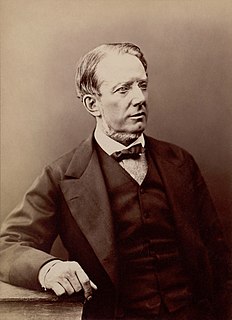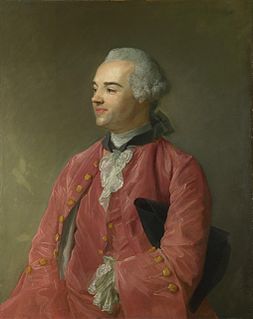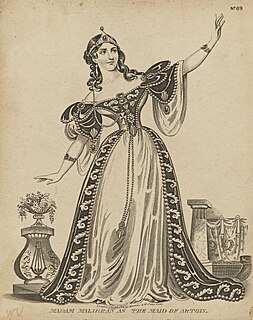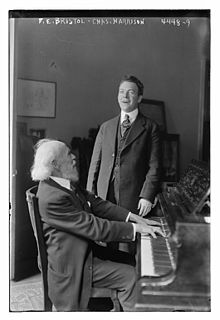
Michael William Balfe was an Irish composer, best remembered for his operas, especially The Bohemian Girl.

William Vincent Wallace was an Irish composer and pianist. In his day, he was famous on three continents as a double virtuoso on violin and piano. Nowadays, he is mainly remembered as an opera composer of note, with key works such as Maritana (1845) and Lurline (1847/60), but he also wrote a large amount of piano music that was much in vogue in the 19th century. His more modest output of songs and ballads, equally wide-ranging in style and difficulty, was also popular in his day, some numbers being associated with famous singers of the time.

The Carl Rosa Opera Company was founded in 1873 by Carl Rosa, a German-born musical impresario, to present opera in English in London and the British provinces. The company premiered many operas in the UK, employing a mix of established opera stars and young singers, reaching new opera audiences with popularly priced tickets. It survived Rosa's death in 1889, and continued to present opera in English on tour until 1960, when it was obliged to close for lack of funds. The company was revived in 1997, presenting mostly lighter operatic works including those by Gilbert and Sullivan. The company "was arguably the most influential opera company ever in the UK".

Benjamin Lumley was a Canadian-born British opera manager and solicitor. Born Benjamin Levy, he was the son of a Jewish merchant, Louis Levy.

The Bohemian Girl is an Irish Romantic opera composed by Michael William Balfe with a libretto by Alfred Bunn. The plot is loosely based on a Miguel de Cervantes' tale, La Gitanilla.

The Devil in Love is an occult romance by Jacques Cazotte which tells of a demon, or devil, who falls in love with a young Spanish nobleman named Don Alvaro, an amateur human dabbler, and attempts, in the guise of a young woman, to win his affections.

The Sapphire Necklace, or the False Heiress, was the first opera composed by Arthur Sullivan. It was never performed, and most of the music and libretto are now lost.

The Maid of Artois is an opera by Michael William Balfe, written in 1836 to a libretto by Alfred Bunn, manager of the Theatre Royal, Drury Lane in London, who based his work on Eugène Scribe's stage version of Abbé Prévost's novel Manon Lescaut.

Alice Nielsen was a Broadway performer and operatic soprano who had her own opera company and starred in several Victor Herbert operettas.
Augustus Frederick Glossop Harris was a British actor and theatre manager.

Edmund Falconer, born Edmund O'Rourke, was an Irish poet, actor, theatre manager, songwriter and playwright, known for his keen wit and outstanding acting skills.

Euphrosyne Parepa-Rosa was a British operatic soprano who established the Carl Rosa Opera Company together with her husband Carl Rosa. Parepa's aristocratic father died soon after her birth, and her mother turned to the stage to support them. Parepa made her operatic debut in 1855, at age 16, and soon earned enthusiastic reviews in the major London opera houses. In 1867, following the death of her first husband, Parepa married the violinist and conductor Carl Rosa in New York, and they founded an opera company with Parepa as the leading lady. They toured successfully in America for several years. After their return to Britain with ambitious plans for their opera company, Parepa fell ill and died in 1874 at only 37 years of age.

Alice May, was an English singer and actress, best remembered as the creator of the soprano role of Aline in Gilbert and Sullivan's The Sorcerer (1877).

Frederick E. Bristol was a celebrated American voice teacher who operated private studios in Boston and New York City during the second half of the 19th century and early 20th century.

Marcia Van Dresser was an American operatic soprano, recitalist and actress. She was sometimes referred to as a mezzo-soprano.

William Harrison was an English tenor and opera impresario. He was best known for creating roles in new operas by British composers from the 1840s to the early 1860s. Among those who composed for him were William Vincent Wallace, Michael William Balfe and Julius Benedict. After working for Alfred Bunn at the Theatre Royal, Drury Lane, Harrison set up a company in partnership with the soprano Louisa Pyne, which enjoyed success in North America and London in the 1850s.

The Armourer of Nantes is an opera in three acts, with music by Michael William Balfe and libretto by J. V. Bridgman. The opera is based on Victor Hugo's 1833 play Marie Tudor and set in Nantes, France, in 1498. The opera was first produced at Covent Garden, under the management of Louisa Pyne and William Harrison, on 12 February 1863.

Rebecca Isaacs was an operatic soprano of the mid-19th century who was the Directress of Operas at the Strand Theatre and who created the role of Leila in Satanella at the Royal Opera House in 1858.

Faust ballets are a set of ballets, choreographed between the 18th and 20th centuries, based on the legend of Faust. As early as 1723, London-based John Rich put on a Faust-inspired ballet pantomime called The Necromancer at the Lincoln's Inn Fields Theatre. In the 19th century several productions took Faust as their subject matter including August Bournonville's 1832 production Faust for the Royal Danish Ballet.

















